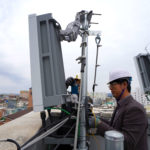The occasion was as remarkable as it was unusual. Perhaps for the first time, Huawei’s famously reclusive founder and head honcho Ren Zhengfei joined a panel discussion with two American technology experts in a live event that was streamed on YouTube this afternoon.
Until a recent turn of events, when Huawei got caught in a trade war between China and the United States, he had kept a low profile, seldom speaking to the media, let alone being live online.
In recent months, he had taken to speaking out, sometimes defiantly, against American suspicions of his company’s links to the Chinese government.
But he struck a different note today. Most surprising was his admission that the US ban on companies selling chips, software and other technologies to Huawei since last month was hurting his company more than expected.
“We did not expect they would attack us on so many aspects,” he said of the Trump administration’s resolve in taking on Huawei.
“We cannot get components supply, cannot participate in many international organisations, cannot work closely with many universities, cannot use anything with U.S. components, and cannot even establish connection with networks that use such components,” he noted.
As much as US$30 billion in revenue could be wiped out, with the lower sales forecast this year. This means the company will bring in US$100 billion this year, down from the US$125 billion to US$130 billion initially expected.
In particular, international shipments of Huawei’s smartphones had plunged by 40 per cent in the past month alone, it was confirmed today. That has come after Google said it had to stop offering its popular services such as Gmail and Maps on future Huawei phones.
The numbers are astounding because they show how abruptly Huawei’s rise has been checked, as if a fast-moving train has had the tracks pulled from under its wheels.
If you viewed Huawei’s – and China’s – success with suspicion, you could say this was just payback for years of widespread copyright infringement and the country’s ban on foreign firms such as Facebook or Google.
Could this round between the world’s two most powerful nations be called for the US, then? That it may just win concessions from China to finally open up, perhaps a little more?
Even so, that victory would be short-lived. What Huawei’s woes show is not just that China still lags the US in terms of innovation, as Ren has said of late, but that the global technology supply chain is so closely interwoven that the damage done unravelling it would be unthinkable.
If China were to hit back, say, stop US firms from using its factories and workers to make new iPhones, or better yet, stop Apple from selling iPhones there, the impact would be pretty devastating to one of America’s famous technology icons.
Already, the tariffs that the two countries have levied on each other’s goods have hurt citizens on both sides. In technology, the pain would go beyond higher prices.
iPhones won’t just be more expensive. They might not work when you bring one to China in future, if this emerging technology cold war plays out into an unlikely but worst-case scenario.
Consider how easily your phone works today, wherever you bring it. That didn’t happen overnight. Indeed, it took several generations of cellphone technology – we are just jumping into 5G now – to get that interoperability going.
Think about the Internet. Sure, China doesn’t have Google or Facebook behind its Great Firewall, but at least it’s using the same underlying software protocols that let anyone view webpages on a standard laptop connecting to a standard network.
Imagine if each country decided, for the sake of cybersecurity or the need to fight a trade war, to come up with its own technologies. From the Internet to mobile devices, people will start to be disconnected. The price will be high to bridge these disparate worlds.
Surely, we won’t go there, you’d think. Given how Trump is so often full of bluster but always pulls back, there’s still a chance that a deal could be struck.
Like how ZTE was given a lifeline after a hefty fine last year, Huawei may just go back to buying from US firms in the months ahead. Don’t forget, US firms lose money too for not being able to selling their software and chips.
Unfortunately, even if a deal is eventually reached, the fault lines won’t be mended so fast. This episode will make Chinese companies double down on research, in their ambition to overtake the US in innovation. The lesson from Huawei won’t be fast forgotten.






